Mobility is often taken for granted. We do it every day and hardly notice how much space and time mobility takes up in our everyday lives. Being on the move is so deeply rooted in us that we have to ask ourselves: Is mobility a basic need? With this question in mind, award-winning director Kristian Gründling embarked on an exciting journey through streets, parks, petrol stations and research facilities. With camera and microphone, he explored very personal perspectives on people's everyday mobility. To kick off a new partnership with ZUKUNFT NAHVERKEHR, an initiative of Deutsche Bahn, we were able to experience a moving film evening together with 150 guests in cold weather outside and delicious popcorn inside on April 24, 2024 at the Munich Urban Colab: the Munich premiere of "A Human Ride".
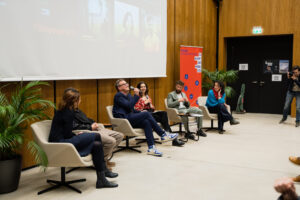
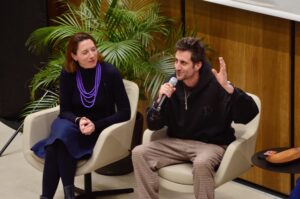
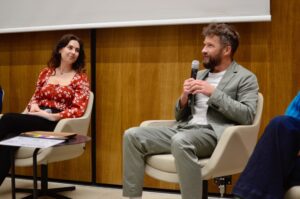
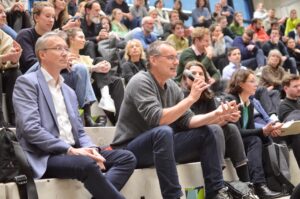
New partnership with ZUKUNFT NAHVERKEHR
Before the film screening, Oliver May-Beckmann, Managing Director of MCube, and Christian Schaalo, Head of ZUKUNFT NAHVERKEHR, took the opportunity to kick off a new partnership. As an industry initiative of Deutsche Bahn Regio, ZUKUNFT NAHVERKEHR aims to create more space and visibility for local public transport in order to drive forward the transport transition through inspiration, exchange and strong messages. These goals fit seamlessly with the goals of the MCube future cluster. The solutions created in the MCube will make the future - including local transport - more attractive! This is why ZUKUNFT NAHVERKEHR and MCube are striving to strengthen each other through the exchange of knowledge and the networking of communities. We look forward to creating more opportunities together!
A movie full of touching stories
An initial reaction from the audience - "Much more emotional than I would have thought" - aptly sums up the intensity of the film. Kristian Gründling and his team have succeeded in illuminating the topic of mobility from a new, more comprehensive and more human perspective in 60 minutes. From the everyday life of a single mother in retail to that of a mid-20-year-old wheelchair user on public transport, from migrant women learning to ride a bike for the first time to Katja Diehl, Germany's best-known mobility activist - the film shows a colorful range of life realities. These different perspectives broaden the viewer's horizons and redefine the concept of mobility. One protagonist with a prosthetic leg sums it up personally: "I can do everything myself, I can manage everything on my own. That's mobility for me". The successful mixture of emotional experiences and well-founded expert opinions on the challenges in the mobility sector makes the film unique. It is not a moral appeal with a raised index finger, but offers a multi-layered basis for discussion. As co-producer Rönke von der Heide emphasizes in the subsequent film discussion: "We tried to portray the basic need in order to create a basis for discussion in the first place." A HUMAN RIDE is a cinematic journey of experience that explores the basic human need to be on the move and makes it tangible.
Followed by a film talk with the director
After the impressive film screening, the subsequent film talk with the director and the invited guests ensured an exciting exchange between the audience and speakers. Under the moderation of Sophia Knopf (MCube), an exciting discussion ensued in which the director Kristian Gründling, the founder of Viva con Agua and protagonist of the film Michael Fritz, Britta Coy, protagonist and director of JUNO - a voice for female refugees, Julianna Günther, Managing Director of the International Building Exhibition (IBA) Metropolitan Region Munich, and the creative co-producer Rönke von der Heide answered questions from the audience and reflected on how the film had influenced them personally. The first to speak was Britta Coy, who runs an association in Munich that offers cycling courses for migrant women, among other things, to give them more flexibility and freedom in their everyday lives. "We need more positive examples," she emphasized, underlining the need to focus more on positive solutions instead of concentrating on what is not going well. When asked by the audience what the motivation for the documentary was, director Gründling replied: "It was very important to me not to open a political discussion, but to take a very personal look at the transformation". With this claim, the makers succeeded in giving the film depth and daring to attempt reconciliation on a controversial future issue. Micha Fritz, founder of Viva con Agua, particularly emphasized the collaboration, because "we already have the solutions and it is also clear that no industry can do it alone".
Charity campaign with Viva con Agua: #mobilityisahumanright
After the event, visitors had the opportunity to have their photo taken in the familiar style of the #waterisahumanright campaign by the charity organization Viva con Agua. For almost 15 years, Viva con Agua has been campaigning for the human right to water with its "Water is a Human Right" campaign and is committed to ensuring that people in the Global South in particular have access to clean drinking water and basic sanitation through numerous fundraising campaigns and initiatives.
At the screening of A HUMAN RIDE, there was also the opportunity to have your photo taken with the slogan #mobilityisahumanride. After the screening, everyone agreed that not only water, but also mobility is a fundamental human right.
Next time, the film will be presented at polisMOBILITY in Cologne and at the Millerntor Gallery in Hamburg - a wonderful opportunity to experience this inspiring film up close. Encountering this film is an opportunity to expand our ideas of mobility and work together towards a future worth living. Let yourself be inspired for a better mobility of tomorrow.
____
"The future of mobility" is a series of lectures organized by MCube - Munich Cluster for the future of Mobility in Metropolitan Regions, Technical University of Munich and openLAB Urban Mobility.
Together - Make it possible
Where to put cars, bicycles and e-scooters - and how do we organize parking space fairly, efficiently and sustainably?
How can mobility data and simulations make cities more liveable - and make change visible and tangible?
The MCube Consulting study shows how the Olympic Games could have a sustainable impact on Munich in terms of sport, society and the environment - something that has already been picked up on by many media outlets.
Munich is considering an Olympic bid - our study shows what opportunities and challenges the Games could bring for the economy, environment and society.
How do we want to move tomorrow? This question was the focus of the Citizens Lab at Marienplatz for six days.
The visual utopian Jan Kamensky presented his latest vision in cooperation with the Munich S-Bahn.
Carolin Zimmer from the Chair of Settlement Structure and Transport Planning and Sebastian Preiß from the Hans Sauer Foundation explain in an interview what the project has achieved and what makes it special.
Major award for a strong team: MCube Consulting receives the Innovation Award of the City of Munich - for a solution that reduces administrative workload, improves security and shows how research enables real change.
If Munich bids for the Olympics again, it will not do so arbitrarily - but with vision, attitude and a clear plan.
MCube had its own stand at the trade fair and brought together over 100 mobility pioneers at the "Bridging City Innovation Ecosystems" event above the rooftops of Barcelona.
No results available
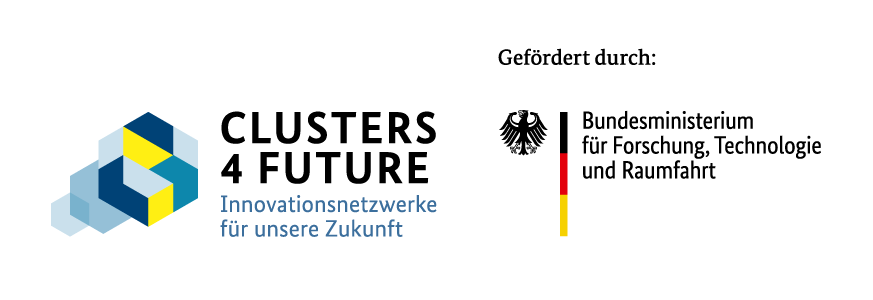
What is MOSAIQ?
Imagine something: There is more space for people. The streets have more trees and plants. Everyone can get around better. That's how your Schwabing-West district could be in the future. How would you like your district to be? We want to talk to you about it!
The project is called MOSAIQ. MOSAIQ is a research∙project. MOSAIQ means: Mobility and urban climate in the future city∙part. The Technical University of Munich is leading the project.
What is MOSAIQ about?
MOSAIQ wants to make the streets in the city∙part more beautiful. People should feel comfortable there. There should be more space. For meetings and plants, for example. You can help decide what is tried out in the Stadt∙teil. The ideas come from you. Some ideas will be tried out on the streets for a certain period of time.
The aim of MOSAIQ is to make urban districts good places to live.
At the same time, the climate in the city should improve. And people should be able to move around the city easily.
What is happening in the district?